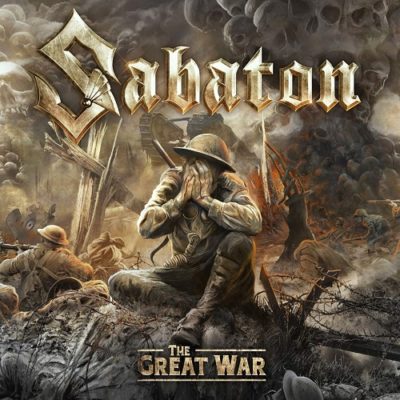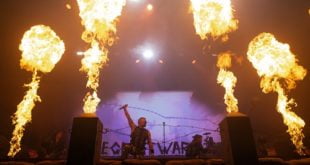 Ahead of the release of the new Sabaton album – “The Great War”, I spoke to singer Joakim Brodén on his trip to London to talk about the album…
Ahead of the release of the new Sabaton album – “The Great War”, I spoke to singer Joakim Brodén on his trip to London to talk about the album…
You’ve got a new album coming out, “The Great War”, and as the name suggests it’s about the First World War. There’s an interesting mix of stories you’ve chosen for the album – you’ve got well known characters like Lawrence of Arabia and the Red Baron, and then you’ve got some not so well known stories such as the Battle of Osowiec.
Yes and also Francis Pegahmagabow in “A ghost in the trenches”. That’s the thing when you make an album, there are certain subjects you can’t avoid, and shouldn’t avoid actually. We wanted to make a song about the Red Baron, but it’s really amazing fun when you get to dig up things that were previously only known to hardcore historians and I guess popularise it in a way because there are so many fantastic stories in military history that are being forgotten. We decided to focus on that rather than maing up new stores.
It must be quite difficult to choose what to write about. You choose the First world war, but there are so many things you could write about that on that topic that it must be hard to narrow it dow to particular stories.
Sometimes it’s the music that decides, and also sometimes things are hidden behind language barriers. Obviously in Sweden studying English from an early age in school, we are being exposed to Swedish, British, American and to a certain extent, Australian history because those are the things that would be more popular. So for us it’s much harder to find out about something about say Turkish history, unless it’s connected to Swedish history (like when King Charles 12th Carolus Rex spent 12 years in Turkey, that we know about). So the Ottoman empire isn’t talked about that much in school, and a lot of the most interesting stuff, the deep dives, are going to be in Turkish, so no matter how much we try and avoid being filtered by language, I guess it’s natural and unfortunate that there will be an over-representation of the material that is available in English or Swedish.
That’s the thing, if the books that cover a story are written in say Russian then unless someone who knows the language tells you about it, you might not even hear about the subject let alone find out any details.
That’s the tricky part, but thanks to our fans we get a lot of mails and sometimes they kind of write the greatest hits of a book – they might send us a book in Portugese from a Brazilian standpoint and they’ll write some information for us about what happened. Then we try and find what we can online or in books or we can ask that person for more information. Sometimes that works out, sometimes not but in the end we end up covering stuff we didnt even plan on doing on the album, and some of our pet projects – that battle that just had to be included, just didn’t make it into the album.
Is that because the song didn’t quite fit or because you’ve covered something similar already?
Both I suppose. Sometimes we’ve covered that aspect already – maybe the songs didn’t fit emptionally. It’s pretty obvious you can’t tell a happy story to a sad song and vice versa but it’s also quite important to us that the way you’re telling the story is in sync with the music. The first song on the album for example, “The future of warfare” has a pretty mechanised industrial feel to it which makes sense because wer’re talking about the introduction of tanks into warfare. We got lucky with that one – sometimes we end up having to throw away both the song and the subject because it didn’t work.
That must be quite frustrating.
Yes! And sometimes the research is wasted. Not on this one, but on “Primo Victoria”, our first released album, I read the book by Antony Beevor, “Stalingrad”, a great author but there was nothing – I mean it’s really detailed and tells you what happened almost daily, or at least weekly, but there was nothing I thought connected to the song. Then I found a translation of a Russian soldier’s diary, only a few pages, online and that became the basis of the lyrics.
You need to find that detail that makes it interesting?
The emotional connection.
There’s quite a dark feel to some of the songs – which makes sense when you’re singing about the horror of war.
I don’t know if it’s the way it’s been portrayed in the media and history books but the Great war and the whole idea of stalemate in the trenches, disease, I don’t know, it feels like a really dark period. I guess us choosing to do that and going that direction made this a darker album than our last album “The last stand”.
You’ve got battles like Passchendaele where they advanced a few yards, retreated a few yards and each day thousands lost their lives.
Indi the guy who does the Great war history channel is also doing the Sabaton history channel. We talked about that being four years of hell and how writing about it affected my mood, researching it so much, and he said look at it like this, at no other time in human history have there been more advances in the medical field as in those four years of war.
That’s one of those things you just don’t think about – we read about the horror but there are also some positive things that have come out of it.
There’s a lot of things we take for granted today and use in a peaceful manner was originally military technology – the internet comes to mind.
And of course victims of gun crime are treated with techniques that the medical profession developed during wars.
I guess the first time you really see cosmetic surgery is when British doctors were trying to treat wounded soldiers coming back.
The album ends in an interesting way as rather than being a typical Sabaton song, it’s a choir singing a poem by John McCrae (In Flanders fields). When I listened to the album it really felt like the perfect way to end the album – it just felt right.
Thank you. That’s probably the only time where we’ve thought less is more. Usually we’re very bombastic, more of everything. Par sent me the poem and some songs based on it, and asked me had I read the poem. Of course I had, I almost got angry, “Of course I know this poem you stupid ass, it’s the most famous war poem ever”. He said “Maybe we should do this”, and I listened to the songs but they weren’t us. I was sitting in the studio writing songs when he called me about it – recorded everything, I want church organ, horns, strings, everything, and I composed it. It felt like it could be a hymn, a Lutheran hymn, and had all those instrumentations in it but it kept getting better the more I removed, and we ended up with this – and nobody from Sabaton is on that track!
It’s strange how things can develop – you start with one idea and the finished product may be totally different.
It’s triple harmony but we removed two of the harmonies for the first part of it. At that point I guess you hear ten women singing the main melody then it expands. I’m really happy with it, how it turned out. It’s really a good way to end the album because the song before that is a bit of a rollercoaster.
Listening to “The attack of the dead men”, which is about the use of poison gas, one of the most horrific things in the war, it’s an amazing story when you read about how the Russians who were dying from the poison gas repelled a huge German army.
A horrific story but also man…there’s poison gas which is hell in itself and being exposed to it…the Russians wrapped any kind of cloth they could around their faces and then the Germans attacking, the numbers vary according to the source but the best estimate is there were 100 Russians still standing, and to make that many (7000) Germans retreat again…. To them it must have been somewhere between mummies and zombies coming at them coughing blood, bleeding from the eyes..
Especially as they were expecting everyone to be dead so they could just march in, and they were confronted by a sight like that.
That’s the reason why that song is a bit different. We chose to use throughout the choruses and the intro, almost what people would consider electronic music, synth, and it’s such a nice addition – it’s soemthing new that doesnt below, like poison gas itself, it doesn’t belong so it gives the song a sort of uneasy feeling.
I think war brings out the worst in men and also brings out the best in men, and the album picks out some of both.
That’s absolutely true. Sometimes it’s the people you least expect who turn into real heroes and people who were the most liked person in the vilage may turn out to be the biggest asshole of them all. I read a story, I don’t know about the truth of it but it seemed credible to me (and this is not world war 1 or album related) but a French village where the angry potato farmer that everyone hated, he saved so many Jewish people by hiding them in his barn or whatever whereas the doctor who everyone liked turned out to be giving details of who had Jewish ancestry to the Gestapo. It’s an extreme situation and sometimes being a hero is not a life’s mission, it’s that split second decision to do something and that can change the whole outlook of everything. You might have been an asshole the rest of your life and then that’s the moment that changes it – and vice versa, you can be a pretty decent kind of guy then when your time comes to step up to the plate maybe you don’t.
A lot of good people are judged badly in history because of that split second, and a lot of people who were kind of assholes get a lot of credit for being nice that one time.
You’re headlining Bloodstock in August. The big question is can you top the show you put on last time?
Oh this time we will have time to build a full stage set and a full show. We had almost a full show last time and we have totally rebuilt it all. We still have a tank – a little bit of a difference on it but everything else has changed. Yeah, Bloodstock will burn !!
More flames, more pyro?
Yes, we did our first show with the new setup in Pilzen in the Czech republic and….
Did you leave the town still standing?
Well they brew our favourite beer so yes. We let them live. I’m really looking forward to it – I really like Bloodstock, it’s a metal festival by metalheads for metalheads and it really shines through when festivals are done for the right reasons. Made more for the love of music than anything else.
And it’s small enough that there are no long walks between stages – it’s compact enough to keep the good atmosphere.
It’s grown to a decent size but they’ve managed to keep the small feel, it’s nice. Sweden rock did it – they’re bigger and expanded up to 33,000 and that’s when they thought they lost the festival’s vibe, so they decided to rebuild the area and scale down to 25,000 even though they were selling out at 33,000.
How big is Sabaton open air?
Not that size – I think 6500-7000 the night we played and 4500-5000 the other days. We decided we will never go over 10,000 because we’re on the area where they have the world championships in skiing so that area was upgraded and we have proper toilets, not mobile ones because it was made for the crowds of spectators, so we figured without expanding too much, without moving to portable toilets, without building huge new areas we could go to maybe 10,000 but we’d be happy to get eith or eight and a half thousand – that would be great.
That’s the trick, finding that capacity where you’re not just letting in as many people as possible, you’re stoping at a size where it’s still easy to move around and it’s still a nice atmospere
Also selling out a bit early means you get proper music fans there who care about the music and each other. Maybe sometimes if you put on a huge festival (there’s nothing wrong with a huge festival, I’m not saying that at all), people might buy tickets last minute – hey the sun is shining, shall we go and check out some bands and get drunk. People who buy tickets six months in advance are there to watch bands and have some fun and if someone falls, they’re the type of people who will stop moshing and help them up – proper music fans.
I like it when festivals put tickets on sale before they announce the lineup because that way you don’t get people going for one specific band, the people who go every year are able to get tickets then if they announce a huge band they don’t miss out. When Pinkpop announced the Rolling stones before putting tickets on sale they were overwhelmed with people who just wanted to see the Stones and some people who went every year couldn’t get tickets. You want the loyal fans to get tickets not the people who will only ever go once.
When we announce the tickets for our festival, the first couple of hundred tickets are at the same price as the first year – 666 Swedish crowns, which is £60. At that point they don’t know of any other band than us. We decided many years ago actually that when people asked us “are you going to build Sweden’s largest festival”, well no we arent and we aren’t going to try, but what we want to do is have Sweden’s nicest rock festival. We have a children’s area – it’s not like you can leave them there, but it’s in a place where you can see the stage wthout being moshed, it’s not going to be super-loud, they can try out instruements, theres someone from us or other bands coming there, and that’s for children to a maximum of 13 years of age. Younger ones can bring parents of course but you’re not allowed to be there if you’re say 19 and drinking.
It’s really good to encourage that younger generation.
Yeah, Heavy metal is not just for middle aged males.
 PlanetMosh Keeping it Metal
PlanetMosh Keeping it Metal


